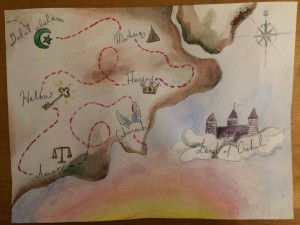The Journey of Ibn Fattouma
This unrealistic map depicts the journey of Quindil from his homeland, Dal al Islam, to the Lang of Gebel. I tried to put little drawings next to each ‘land’ that he visits with characteristics of their government or society. Also, there is a sunset at the bottom of the map which fades into the ocean because in class we talked about how the names of each of the places allude to the sun rising and setting. Finally, if you could please notice that a compass at the right hand corner points to ‘G,’ which stands for ‘Gebel,’ I would really appreciate it because if you couldn’t tell, I’m pretty proud of this map. (It took the longest time out of all of them…)
Anyways, I learned in class that the story was modeled after the real story of Ibn Batutta, who also traveled and settled in many lands as Quindil did. I didn’t really like the narrator because I thought he was irresponsible for not sticking to his (ultimately honorable) motives of traveling to gather ideas to improve his homeland, and instead, settling in every single place he visited to make a family. He seemed pretty undecided over whether he wanted security and family ties or to travel and reach the Land of Gebel—I felt bad for the children that he left behind.
Anyways, Quindil seems to ask the same questions that Iqbal does in his poem, concerning frustrations with the hierarchy and existing authorities and questions what kind of government—he wants it to be Islamic, but many place he visits are not—is the most effective and least likely to become corrupt, while eliminating poverty, protecting freedom, and fostering development?
The answer is not clear as each society seems to have given up something in exchange for its first priority, whether it be freedom in Halba or justice in Aman.
I liked the symbolism of each place Quindil visited as well; Mashriq as primitive, Haira as a monarchy, Halba as America or democracy, and Aman as communism. Although they were obvious, criticism in the form of a story made me think of the values of different nations in a refreshing way.
